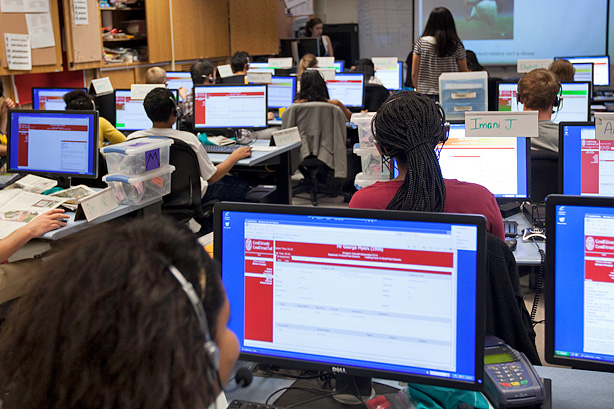
In just the past six years, the Cornell Annual Fund has employed 700 student callers who have made approximately 300,000 calls, and raised about a million dollars per year from the people they speak to. The student callers make calls six days per week, 180 days per year. Photo: Robert Barker/University Photography.
Cornell Annual Fund student callers: 'Best student job on campus' keeps getting better
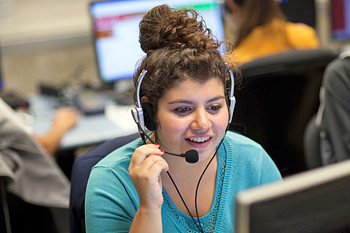
Cornell Annual Fund student caller Nicole Calautti '17 works the phones Sept. 26 in Carpenter Hall. Photo: Robert Barker/University Photography.
It's 6:30 in the evening on a chilly Wednesday in September in Ithaca. Campus is just getting up to speed for the semester, humming with classes and prelims. A few trees are tinted orange or gold. Thirty-three students gather in the "Blue Lab" in Carpenter Hall. They look excited, happy, relaxed. Most wear jeans. They take their assigned seats behind computer monitors.
Two thousand miles west in Durango, Colo., the phone rings in the living room of a Cornell Law School alumna. She picks it up on the third ring. "Hi!" a young voice says: "This is Vanessa calling from Cornell University. May I speak to Nora Klein, please?"
What happens next might be a quick end to the call ("Sorry, it's a bad time!") or a brisk three-minute chat about changes of address and a gift to the Cornell Annual Fund (CAF). And there's always the chance that the call might turn into a deep, 15-minute conversation between two Cornellians who have never met -- and who are separated by a generation or two, or more -- who find that they are both from Denver and fans of baroque chamber music.
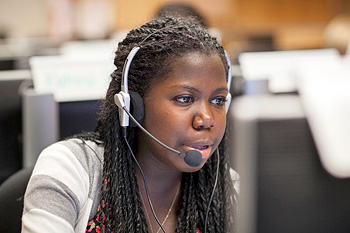
Cornell Annual Fund student caller Natalie Bramble '17. Photo: Robert Barker/University Photography.
In fact, many of the calls turn into fun conversations. The average length of a call is eight minutes. Students answer questions about Cornell's latest developments, departmental news or national rankings.
"You always have your fair share of people who aren't so happy to talk to you," says Emily Polk '14, a chemical engineering senior and member of the management team for CAF's student callers. "But also there's a great and surprisingly high number of people who are very excited to hear from Cornell." The enjoyment is mutual, she explains: "It's always nice to take a break from studying or doing a problem set to get on the phone and talk to some people. It sort of relaxes your brain."
Since 1997, Cornell's alumni, parents and friends have been getting phone calls from students, who serve a dual role as university ambassadors-turned-fundraisers. In just the past six years, CAF has employed 700 student callers who have made approximately 300,000 calls, and raised about a million dollars per year from the people they speak to. The average over-the-phone gift in fiscal year 2013 was $167.45, up from $128.52 in fiscal year 2008, and gifts range in size from a few dollars to a recent $5,000 (from an alumnus who had never made a gift to Cornell before).
The Cornell Annual Fund as a whole raises more than $30 million a year ($33.3 million last year) for the university, from more than 34,000 individuals, and provides crucial unrestricted support to the colleges, units, central university and a few key budget areas, like student financial aid.
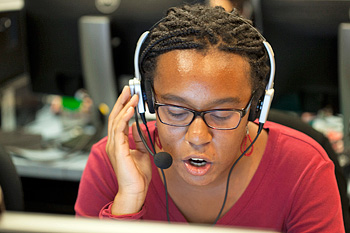
Cornell Annual Fund student caller Imani Jasper '16. Photo: Robert Barker/University Photography.
Seeking that personal connection
In fiscal year 2013, 29 percent of the people who answered their phones made a gift or pledge. So while there are many calls that may not result in a gift today, those calls matter to Cornell too, according to Joe Lyons '98, CAF director since 2010.
"It is the one-on-one personal connection that happens with every conversation," Lyons says. "That's what brings a little bit of Cornell to people far and wide, and that's what makes this program so special, over and above its impressive fundraising results."
This September, the CAF phonathon team added 50 new members, selected from nearly 200 applicants.
"It's the best job on campus," says Catherine Li '14, another member of the student management team. Why? Convenient evening hours, a competitive starting pay rate of $9 per hour, esprit de corps, transferability of skills to the real world after graduation and job satisfaction. It's a part-time job, but a full-time operation. CAF student callers make calls six days per week, 180 days per year.
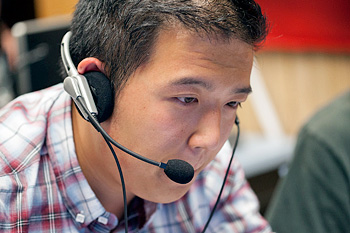
Cornell Annual Fund student caller Derrick Wang '15. Photo: Robert Barker/University Photography.
The staff person overseeing the otherwise student-run program for the past six years is Jennifer Hudler Kwiatkowski, who says, "I care about these kids deeply." She also cares about the fundraising success of CAF and has steadily instituted improvements. "Over the last four years," she says, "we've enhanced our training, coaching and motivational programs, and our fundraising success has increased as well. We've shown growth in average gift size, percentage of people who give by credit card during the call, and credit card dollars, which tells me the students are doing a great job representing the university and re-establishing connections with the campus community. We are constantly seeking to ensure that this experience is as great as possible for both the student staff and the alumni, parents and friends we reach."
But you can't reach everybody. At the beginning of the semester, Polk made a point during an introductory PowerPoint presentation to new callers to explain what a busy signal sounds like. She even brought a recording of a busy signal to share, so that the room full of current Cornell students -- many of whom have never called a landline in their lives -- could hear it.
Related links:
Join the Cornell Annual Fund callers!
Give to the Cornell Annual Fund